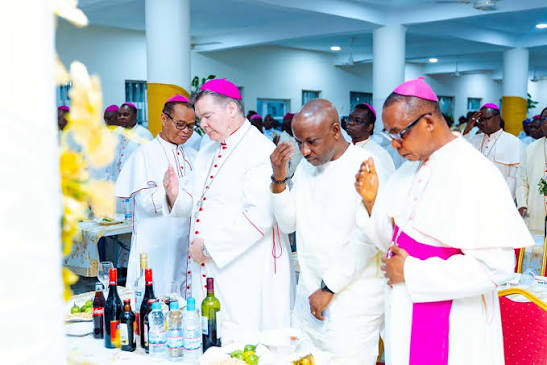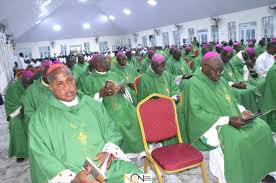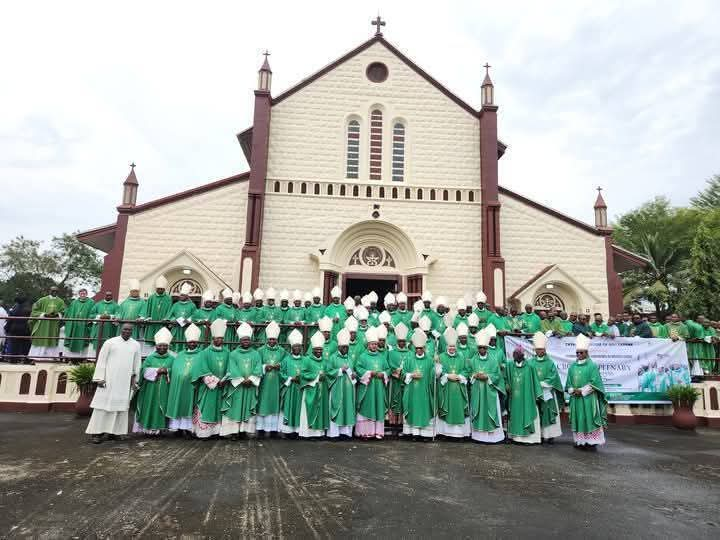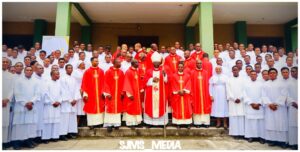HOPE DOES NOT DISAPPOINT: WORKING TOGETHER FOR A JUST NATION
A Communiqué issued at the end of the Second Plenary Meeting of the Catholic Bishops Conference of Nigeria (CBCN) held at the Diocesan Retreat and Youth Development Centre, Nto Ekpu Ikot, Nko, Obot Akara L.G.A., Ikot Ekpene Diocese, Akwa Ibom State, 11-19 September 2025.
1. PREAMBLE
We, the Catholic Bishops of Nigeria, held our Second Plenary Meeting for the year 2025 at the Diocesan Retreat and Youth Development Centre, Ikot Ekpene Diocese, 11-19 September 2025. Having prayerfully reflected on issues affecting the Church and the Nigerian State, we issue this Communiqué:
2. WE LIVE IN CHRISTIAN HOPE
Hope is one of the cardinal virtues of the Christian faith. It is not naïve optimism or wishful thinking. Hope is a confident expectation in the promises of God grounded in His character and faithfulness. It is anchored in the certainty that God fulfils what He promises (Hebrews 11:1). We recall the words of St. Paul: “Hope does not disappoint us, because God’s love has been poured into our hearts through the Holy Spirit” (Romans 5:5). We, therefore, call on our people to persevere in Christian hope and work towards justice in our nation in spite of our sufferings and afflictions.
3. Family and Responsible Parenting
The family, described by St Pope John Paul II as the domestic Church (cf. Apostolic Exhortation, Familiaris Consortio, On the Role of the Christian Family in the Modern World, 21), is the bedrock of society. We are deeply troubled by the erosion of family values and the rising trend of poor parenting. We condemn the scourge of prostitution, which dehumanizes the human person and undermines the family. We urge parents and guardians to embrace their God-given responsibility as the first educators in faith and morals (cf. Vatican II Declaration on Christian Education, Gravissimum Educationis, 3), nurturing their children with discipline, love, and Christian values. A healthy society derives from healthy families, and sound families require responsible and God-fearing parents.
Besides, there is a proliferation of fertility clinics in Nigeria today as a result of high rate of demands by a good number of couples seeking to have children through assisted reproductive technology such as In Vitro Fertilization (IVF). This practice has a lot of implications on the dignity of human embryos which are often wasted in the process. The operators of IVF seem to ignore the moral implications of their choices. We, therefore, reaffirm the teaching of the Church which regards IVF as gravely immoral because it separates the unitive and procreative aspects of the marital act, a separation which the Church condemns as sinful. While we are deeply concerned about the pain, struggles, and emotional challenges faced by childless couples, we uphold the Church’s moral position on the appropriate means of procreation. We, therefore, encourage adoption of children and use of natural family planning methods and morally based medically assistance.
Furthermore, we observe with grave concern, the resurgence, among our young people, of idolatry, occult practices, and superstitions under the guise of returning to African Traditional Religion. These delusive spiritualities exploit the human thirst for meaning but ultimately enslave rather than liberate. In the light of the Church’s teaching that true freedom is found in Christ (cf. Vatican II, Pastoral Constitution of the Church in the modern World, Gaudium et Spes, 17), we call on all to help young people to hold firmly to the Gospel and reject ideologies that distort the truth. Parents, teachers, catechists, and pastors must accompany them with sound formation, prayer, and credible Christian witness.
Still more, the digital age presents both opportunities and dangers for our children. While information and communication technology can serve education, evangelization, and social development, its abuse — particularly the misuse of smartphones and other digital devices — corrupt the morals of many young people through pornography, cybercrime, and addiction. In line with the Church’s teaching on the common good (cf. Vatican II, Pastoral Constitution of the Church in the Modern World, Gaudium et Spes, 26), we call on parents and educators to provide guidance, monitoring, and digital literacy, ensuring that technology serve human dignity rather than destroy it.
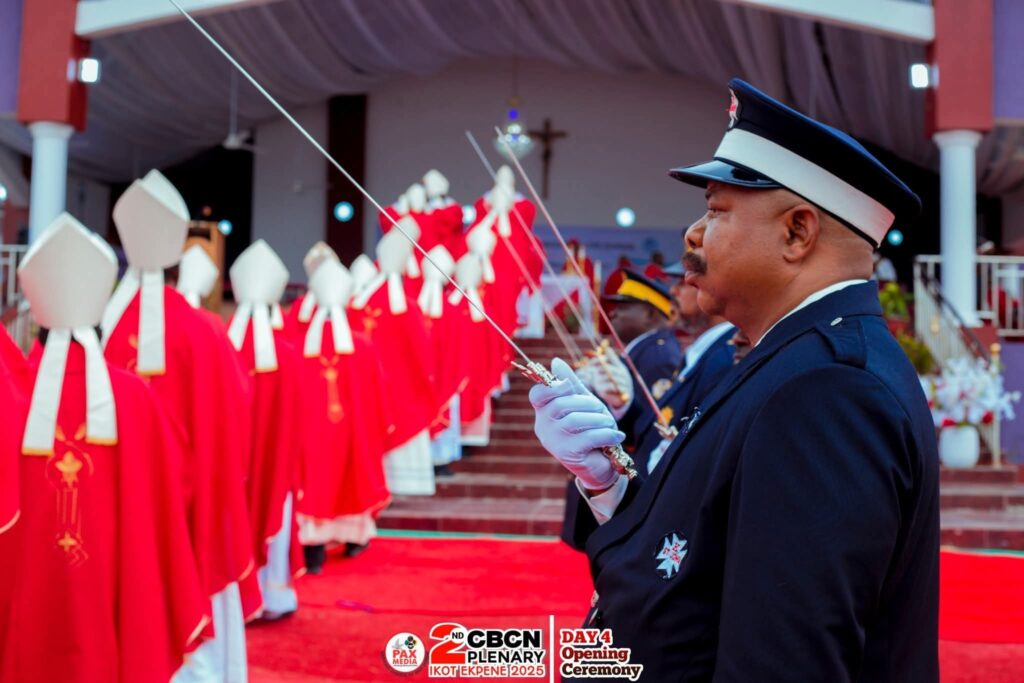
4. Deviations from Liturgical Norms
We as Conference have consistently expressed deep concern over deviations from established liturgical norms and traditions within the Church. These unfortunate actions, which include multiple collections and fund raising, are a direct affront to the sanctity of the sacred liturgy. As we earlier noted in our communique at the end of our second plenary assembly at Auchi Diocese in 2024, these aberrations are sources of scandal that hurt the sensibilities of many devout Catholics. Priests who deviate from established liturgical norms betray their sacred duty and lead the faithful astray. We, as chief liturgists in our Dioceses should do more to promote, moderate and guide the liturgical life of our local Churches. Another worrisome trend is the practice of allowing politicians to use the sanctuary during liturgical worship. Very often, such opportunities are misused for mundane and self-serving purposes. The Church is not just any building; it is a sacred space with its sanctity respected (cf Vatican II Constitution on the Sacred Liturgy, Sacrosanctum Concilium, 32).
5. The Challenge of Private Ministries
Religion in our country is being exploited and seen by some as merely a means of achieving instant material well-being or obtaining healing and security. The situation is compounded by the emergence of many charlatans, owners of so-called private ministries and preachers of prosperity gospel who masquerade as modern-day prophets and evangelists. In the absence of effective regulations and oversight structures, these ministries operate with impunity. We reiterate our appeal to Diocesan Bishops and Major Superiors to stand strongly against these unorthodox practices and remind their subordinates of the importance of unwavering fidelity to our Catholic doctrines and practice (cf. Code of Canon Law, Can. 305).
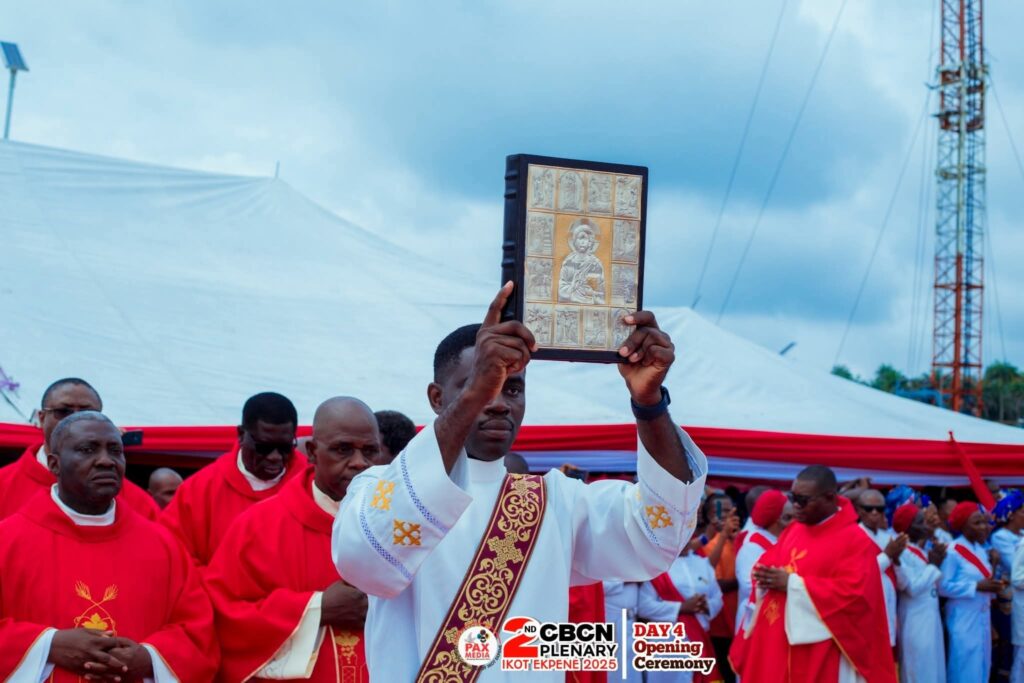
6. The urgency of Catechesis
The word “catechesis” means “to teach.” Catechesis is vital today for fostering deep communion with Jesus Christ, providing clear and systematic teaching of Catholic doctrine, and forming lifelong faithful disciples who can live out their faith with compassion and truth. We, therefore, urge our pastoral agents to engage in teaching catechism, conducting regular instructions and marriage courses, with the aim of explaining the faith to our children, young people and adults. We enjoin our priests to prepare and deliver good and impactful homilies. These measures will help to teach our people the Christian faith and help them to persevere in the Gospel values.
7. State of the Nation
Some Positive ChangesWe are glad that our nation, Nigeria, is gradually witnessing some positive changes at various levels. As we noted in our last communique in March this year, this progress is in the areas of road rehabilitation and construction in some parts of the nation, the new minimum wage, and increased allocation of funds to the states, among others. We appreciate the recent Federal Government’s tax reform efforts aimed especially at curbing multiple taxations and giving relief to low-income earners. We commend the government for its efforts towards ensuring food security. We also recognise the efforts of some security agents, who often work and sometimes sacrifice their lives in fighting to protect the lives and property of fellow citizens.
Many Persistent Challenges
In spite of the progress, we observe that our nation still faces persistent challenges in many areas. Insecurity continues unabated with many citizens kidnapped, dehumanised, killed or forced to flee their homes forsaking their means of livelihood. We are profoundly worried that our people have continued to suffer under extreme poverty and economic hardship and appear abandoned to a life of destitution and penury. We are also troubled about the increased rate of youth unemployment which leads many to get involved in criminal activities and many others to migrate in search of greener pastures abroad, resulting in the loss of many of our best brains. Our inadequate health facility is also a source of great worry. Indeed, the mass exodus of our health professionals due to poor working conditions and the high rate of medical tourism by our leaders are a testimony to the crumbling state of our health sector. While billions of Naira are spent overseas, millions of Nigerians languish and die at home from curable illnesses as a result of the poor state of our healthcare facilities. It is the same situation with our educational institutions that are faced with the problems of inadequate funding, dilapidated infrastructure and ever decreasing number of qualified teachers, leading to a steady fall in the quality of education. The energy sector is also a source of concern as there are cases of regular power outage and use of outmoded and overstretched infrastructure. This results in exorbitant costs for businesses and individuals and limited access to electricity by a large portion of the population.

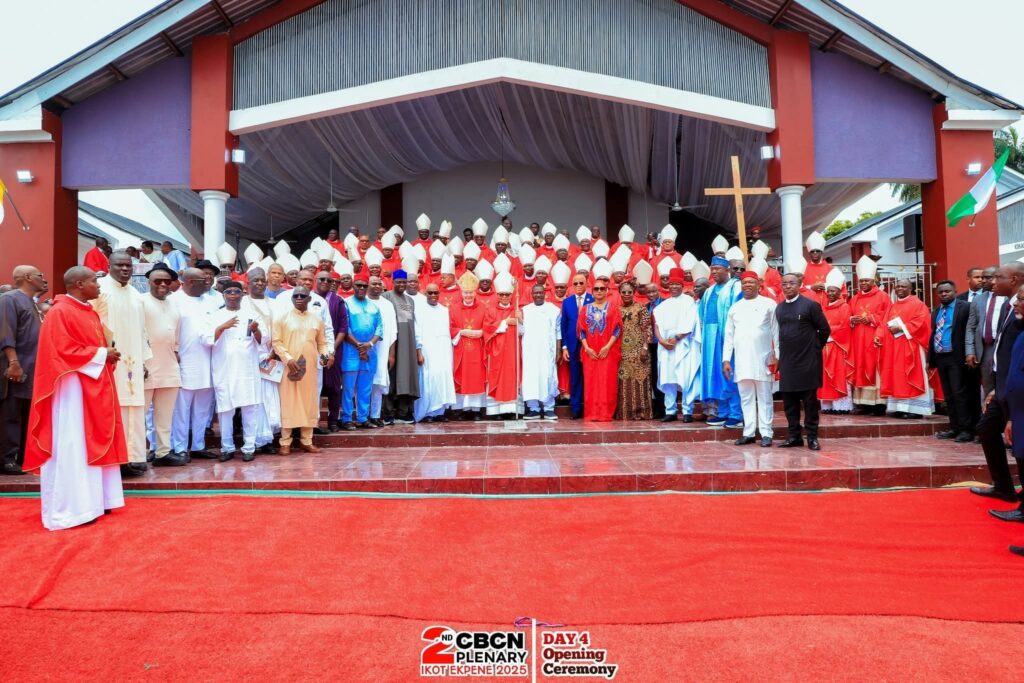
(iii) Corruption and Bad Governance:
The Cause of our ProblemsThe fundamental cause of our problems as a nation is corruption and bad governance. Corruption understood as moral rottenness, has spread unhindered like a deadly cancer to all areas of our national life, aggressively destroying the fabric of the nation. In the face of many live threats, politicians are more preoccupied with securing and retaining power and less concerned with good governance for the common good of the electorate. Abandoning their duties, they seem more concerned with the pursuit of their personal political agenda and perfecting strategies to grasp power in 2027. In fact, there seems to be suppression of opposition as Nigeria appears to be tilting to a one-party state, the development of which is not a good omen for democracy. We observe that many politicians are merely strategizing, aligning and realigning, defecting from one party to another; and posturing for future political offices with little or no intention to contribute to the common good and make better the lives of the citizens.
(iv) The Way Forward
Our nation may collapse if the current situation lingers. There is need for a radical change to where the common good drives our political, economic, social and cultural life. The government, the Church, the education sector, the media and indeed all citizens have their roles to play.
Electoral ReformThere have been persistent electoral flaws in our nation such as electoral violence, voter suppression, technical failures, multiple thumb printing of ballot papers, manipulation of voters’ register, and declaration of fake electoral results. This state of affairs results in increasing voter apathy that is experienced in our country today. In order to radically reduce electoral malpractice in Nigeria, we call for a more robust and comprehensive electoral reform that should not only ensure an electronic transmission of results from the polling units, but also their electronic collation in real time.
Moreover, to fully restore the confidence of voters in the electoral process, electoral reform must ensure transparent and unbiassed appointment of the principal officers of the Independent National Electoral Commission (INEC), who are to be non-partisan and persons of unquestionable integrity. Unfortunately, the activities of many of those so far appointed fall below expectation. This calls for the amendment of the relevant laws to strengthen the independence and credibility of INEC and protect it from interference. We call on the judiciary to live above board in electoral matters. This is necessary for the maintenance of social stability in our nation.
Political Education of Citizens to Work for the Common Good. We request INEC and other relevant agencies to engage in intensive political education. We are resolved to intensify efforts in forming the Lay Faithful, so that they will fully exercise their role of transforming the temporal order with Christian principles, which is the specific task of the laity’s vocation in the world” (Vatican II, Pastoral Constitution of the Church in the modern World, Gaudium et spes,75; St Pope John Paul II’s Post-Synodal Apostolic Exhortation on the Church in Africa, 107). We, therefore, urge our citizens to perform their civic duties at all times. One of the duties of a citizen of a country is to vote during elections.
Currently, we are witnessing a high rate of voter apathy in our communities. We encourage all adults of voting age to get their permanent voter’s cards ready and vote at general elections in accordance with their informed conscience. We strongly advise our citizens not to allow themselves to be influenced by bribes, or swayed by promise of instant gratification, intimidation, or ethno-religious considerations during elections
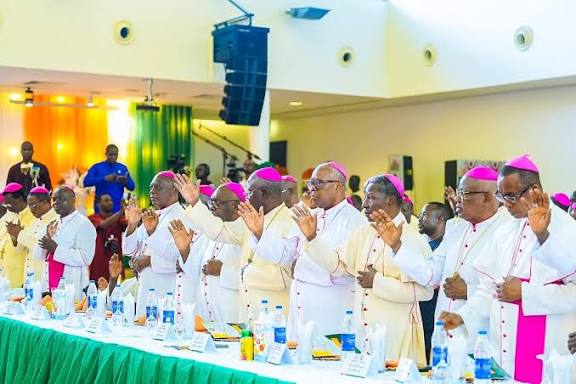
- The Role of the Lay Faithful in Transforming the Temporal Order
We believe that the Lay Faithful have a major and decisive role to play in politics. We are convinced that we have a formidable laity, who being the salt of the earth (Matt 5:13), the light of the world (Matt 5:14-16) and the leaven of the society (Matt. 13:33), can help to a large extent to transform the temporal order. They do this by being living witnesses in the family as well as in the political, economic, social and cultural spheres of our life. They infuse these areas with the values of the Gospel, fostering the common good, working for social justice and promoting human rights. We encourage honest, qualified and God-fearing Lay Faithful to join political parties and persuade those with the talent for leadership to seek political office and be voted for as a way of advancing the common good in accordance with the social teaching of the Church, which is a common heritage of humanity.
d. Care for the Earth, Our Common Home, especially the Niger Delta
Our nation is hugely blessed with an ecosystem that could engender good living. Unfortunately, the ecosystem in some parts of the country especially the Niger Delta region has been badly degraded through various factors such as oil spillage, gas flaring, other forms of pollution and excessive exploitation of the environment with devastating impact on plants, marine life and on the health and livelihood of millions of people who live in the region and beyond. This has led to a sequence of multi-dimensional poverty among its inhabitants. We remind all of us that nature is a gift to humanity by the Creator, who enjoins us “to cultivate and take care of it” (Gen 2:15; Pope Francis, Laudato Si’, On Care for our Common Home). We call on the government to put in place more stringent measures in cleaning up oil spills, re-greening of areas devastated by pollution and precluding further degradation of the region. Rehabilitating individuals, families and communities that have been deprived of their sources of livelihood should be perceived as a matter of social justice, and treated with the urgency it deserves. In addition, we request that all the seaports located in the Niger Delta be made to function effectively and legitimately. This will help to create employment opportunities, check youth restiveness and the temptation to oil bunkering and other forms of criminality in the region. It will also enable relevant businesses to thrive.
- Support for Integral Education
There is need for standardization of schools in our nation. We appreciate the new “National Policy on Non-State Schools” issued by the Federal government, which aims at ensuring that non-state schools adhere to national standards in infrastructure, learning environment safety, teacher quality, curriculum delivery and stronger accountability measures. Catholic schools have always been known for excellence in education. To maintain our traditional excellence in education, we encourage Dioceses and Religious Congregations to benchmark their schools against the national minimum standards set by government to establish their strengths and weaknesses, and to identify areas for improvement. Given the holistic nature of Catholic education, which is meant to prepare a child adequately for life here and hereafter, all Dioceses and Religious Congregations are to ensure that there is zero tolerance for examination malpractice, cultism and drug abuse in their schools. We use this opportunity to urge the government to put in place adequate measures to eliminate examination malpractice in public and private institutions of learning. We wish to remind the government that catholic education is not for profit and as such should be tax exempt. We rather demand that government give all necessary support to Catholic schools since those who study in these schools are also Nigerian citizens.
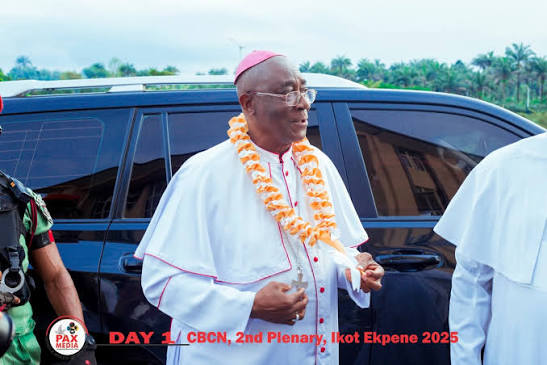
- Increased Attention to Agriculture
Agriculture presents a major source of economic and employment opportunities in our nation. We thank God for the vast expanse of fertile and arable lands available for farming in our country. We call on governments at all levels to create sufficient enabling environment such as mechanization, adequate security, access roads and incentives to enable farmers work towards production of food for all. We equally request governments to put in place regulation that will prohibit production of genetically modified organisms (GMO) in order to preserve the life and health of our citizens.
8. Events in the Church
The Holy Father Pope Francis, of blessed memory, passed on at the age of 88 years on the 21 April 2025. Five days after his death, he was buried in the Basilica of Sancta Maria Maggiore, Rome. We pray for the peaceful and eternal repose of his soul. In one of the shortest conclaves in history, Robert Francis Cardinal Prevost, OSA was elected to succeed Pope Francis. He took the name Pope Leo XIV. His pontificate was inaugurated on the 18 May 2025 with a solemn Mass at St. Peter’s Square. A delegation including some Bishops and Archbishops represented the Church in Nigeria at these events. We thank President Ahmed Bola Tinubu for personally leading the Nigerian delegation to the inauguration of Pope Leo XIV. The Holy Father accepted the resignation of Most Rev Camillus Archibong Etokudoh as the Bishop of Port-Harcourt on 9 April 2025. We wish him a well-deserved rest at his retirement. We equally congratulate the Most Rev. Patrick Eluke on his appointment as the Apostolic Administrator of Port-Harcourt Diocese. We wish him a period of fruitful and dedicated service. The national celebration of the Jubilee Year of Hope by the Catholic Bishops of Nigeria will be held at the Sanctuary of Jesus the Saviour in Elele, Rivers State, from 19 to 21 September 2025. The event will feature pilgrimages to holy sites and will foster faith, hope and renewal within the country. On a sad note, we received the news of the death of Bishop Francis Ogbonna Okobo, the Bishop Emeritus of Nsukka Diocese on 29 August 2025. We express our condolences to the bishop and indeed the entire Faithful of Nsukka Diocese, with the assurance of prayers for those who mourn him. He will be laid to rest in St Theresa’s Catholic Cathedral, Nsukka on Tuesday, 23 September 2025. May God reward his labour and may his soul rest in perfect peace with the Lord. Amen.
✠Lucius Iwejuru Ugorji✠Donatus A. Ogun, OSAArchbishop of OwerriBishop of UromiPresident, CBCNSecretary, CBCN
